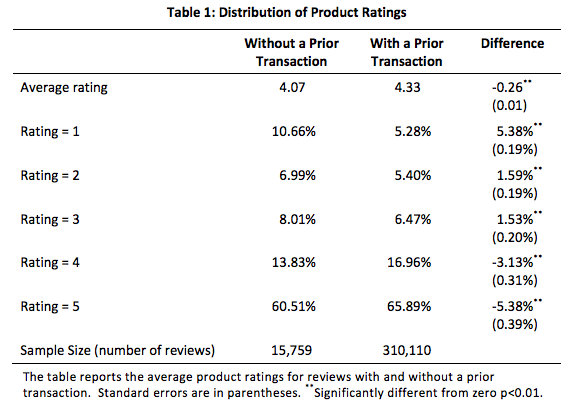The Truth About Fake Online Reviews
Sellers on all sorts of Internet selling sites allege that fake negative reviews hurt sales, while buyers complain that fake positive reviews misrepresent a product or service, each side of the debate with little data to back up either claim—until now. A new study has delved into the horrible world of deceptive online reviewers, finding that sometimes its as bad out there as retailers and consumers imagined. But that most of the time, a negative comment is pretty fair. That's right, as much as we hear the sensationalist stories about how Internet reviewers ruin businesses, on the whole they're not so bad. On the whole, the study clears up a lot of myths about the whole ecosystem.
RELATED: How to Protect Yourself from Yelp's Robot Protection
Myth 1: Fake Reviews Come From Rogue Agents or the Competition
False. There's a perception out there that extreme fake reviews either come from the competition or from customers paid in freebies and deals to say nice things about a company. In the sample, most of the people who wrote deceptive reviews had purchased something from the site—just not the actual product they were reviewing. In other words, they were actual customers. "Instead the low rating effect appears to be due to actual customers engaging in this behavior for their own intrinsic interests," reads the study. "In this respect, the findings represent evidence that the manipulation of product reviews is not limited to strategic behavior by competing firms. Instead, the phenomenon may be far more prevalent than previously thought."
RELATED: A Postcard from David Foster Wallace; Amazon Locks Authors Out of Reviews
Myth 2: Most Extreme Negative Reviews Are Fake
False. While 5 percent of the reviews came from customers who hadn't purchased the item in question and fall into the "fake" category, 95 percent of the 325,869 sample were genuine—and not all of them glowing. As the chart below shows, while the fakers (those "without a prior transaction") gave more 1 star ratings, more than 5 percent of "real" people doled out disappointed one-star reviews.
RELATED: Amazon Kindle Fire HD Reviews: Not 'the Best Tablet at Any Price'
RELATED: Inside the Method to Amazon's Beautiful Warehouse Madness
Myth 3: Most Fake Reviews Are Negative or Extreme
False. While the fake reviewers skew more negative than the real ones, a majority of the fake reviewers still gave a five-star rating, as you can see in that chart above. There's also a good chunk that falls in the two-star to four-star range. Why people want to write middling reviews for products they didn't buy, however, is left unexplained. The researchers suggest some of these people somehow landed on the wrong product page, by accident. Or, perhaps, these people took it to the comments to express general feelings about the brand.
RELATED: The Chart That Shows Why Advertisers Won't Give Up on Facebook
Myth 4: Fake Negative Reviews Hurt Sales
True. Low-star reviews hurt sales more than higher ones, unfortunately. So, yes, any fake negative reviews—especially the most extreme ones—will result in lower returns. However, that has a "negligible expected impact on a competitor," write the researchers, which is probably why the competition shouldn't spend time spamming the Yelp sections of neighboring establishments.


